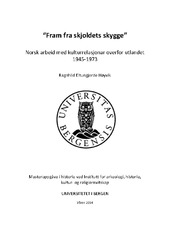| dc.contributor.author | Høyvik, Ragnhild Eitungjerde | eng |
| dc.date.accessioned | 2014-09-01T08:59:04Z | |
| dc.date.available | 2014-09-01T08:59:04Z | |
| dc.date.issued | 2014-05-15 | eng |
| dc.date.submitted | 2014-05-15 | eng |
| dc.identifier.uri | https://hdl.handle.net/1956/8385 | |
| dc.description.abstract | Temaet i denne oppgåva er opprettinga av ein norsk institusjon for å fremje norsk kultur og samfunnsliv i utlandet og forvalte Noreg sine kulturelle relasjonar med omverda. Det kontekstuelle bakteppet var avslutninga på to verdskrigar etterfølgd av ein "kald krig" mellom to antagonistiske supermakter. Under desse omstenda var det ei oppfatning av at meir kunnskap om kvarandre kunne føre til auka forståing og tillit landa i mellom. Oppgåva viser at motivasjonen for å etablere denne institusjonen mellom anna baserte seg på førestillingar om at Noreg hadde særskilte føresetnader for å skape mellomfolkeleg forståing i det internasjonale samkvemmet. Det blir også undersøkt korleis arbeidet med kulturelle relasjonar med utlandet tok til og korleis ein ønskte å organisere dette. Frå visjonar om eit institutt delvis finansiert av det private næringslivet, enda ein i 1950 opp med eit heilstatleg kontor: Kontoret for kulturelt samkvem med utlandet. Dette kontoret, og den verksemda det dreiv, står sentralt i heile oppgåva. Oppgåva kartlegg såleis kva dette kontoret faktisk hadde som verksemd og kva ein ville oppnå med det. Ein viktig del av verksemda var å forvalte internasjonale og bilaterale kulturavtalar med land både aust og vest for jernteppet. I tillegg dreiv kontoret aktivt opplysingsarbeid i utlandet gjennom ulike publikasjonar om Noreg. Oppgåva går nærare inn på begge deler. Oppgåva syner vidare kva bilete av Noreg ein ønska å formidle til omverda gjennom desse publikasjonane. I analysen av dette er framstillingar av eit naturgjeve demokrati og ei foreining av det tradisjonelle og moderne Noreg sentrale. Til slutt syner oppgåva korleis kontoret vart omorganisert i overgangen til 1970-talet og kva implikasjonar dette hadde. Oppgåva viser at det var ei tidstypisk utvikling i verksemda til dette kontoret. Frå å vektlegge kulturrelasjonar for å bygge tillit mellom statar frå 1950-talet, gjekk ein gradvis over til å prioritere meir strategisk informasjonsarbeid om Noreg ut frå handelspolitiske motiv frå midten av 1960-åra. | en_US |
| dc.description.abstract | This thesis sets out to explore the establishment of a Norwegian institution for promoting Norwegian culture and society abroad and managing Norway's cultural relations with the outside world. The contextual backdrop was the conclusion of two world wars succeeded by a "cold war" between two antagonistic superpowers. Under these circumstances there existed a perception that more knowledge about each other could lead to increased understanding and trust between countries. The thesis shows that the motivation for establishing this institution, among other things was based on the notion that Norway had special prerequisites that made the country suitable for creating trust and understanding between peoples. The project also examines how the work for cultural relations with other countries played out and how it was to be organized. From visions of an institute partly funded by the private sector, Norway in 1950 ended up with a government office: The Office for Cultural Relations Abroad. This office and its activities are central to the whole project. The thesis thus identifies how this office operated and what its intentions were. An important part of the activity was to manage international and bilateral cultural agreements with countries both east and west of the Iron Curtain. In addition the office conducted information work abroad through various publications about Norway. The paper elaborates on both. The thesis discusses further which images of Norway the office wanted to convey to the outside world through these publications. Representations of a natural given democracy and a unification of the traditional and modern Norway are central in this analysis. Finally, the thesis shows how the office was reorganized in on the thresholds to the 1970s and the implications of this. The thesis shows that the development in the activities of this office was quite typical. From emphasizing cultural relationships for building trust between states from the 1950s on, a gradual shift took place from the mid 1960s towards more strategic information efforts about Norway on the basis of trade policy design. | en_US |
| dc.format.extent | 1059940 bytes | eng |
| dc.format.mimetype | application/pdf | eng |
| dc.language.iso | nno | eng |
| dc.publisher | The University of Bergen | eng |
| dc.subject | kulturdiplomati | eng |
| dc.subject | cultural diplomacy | eng |
| dc.subject | fredstradisjon | eng |
| dc.subject | utenrikspolitikk | eng |
| dc.title | "Fram fra skjoldets skygge" Norsk arbeid med kulturrelasjonar overfor utlandet 1945-1973 | eng |
| dc.type | Master thesis | |
| dc.rights.holder | Copyright the author. All rights reserved | |
| dc.description.degree | Master i Historie | |
| dc.description.localcode | MAHF-HIS | |
| dc.description.localcode | HIS350 | |
| dc.subject.nus | 713107 | eng |
| fs.subjectcode | HIS350 | |
